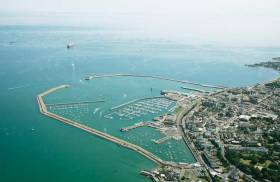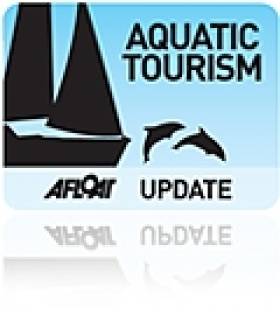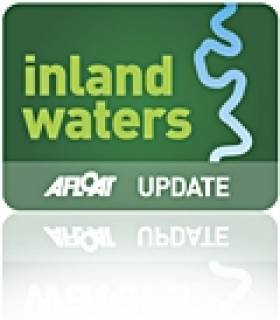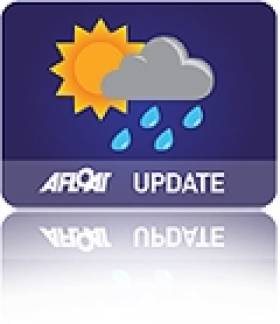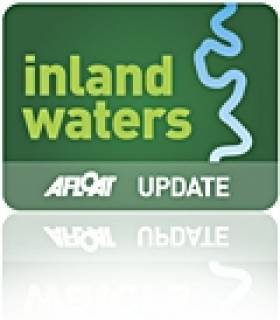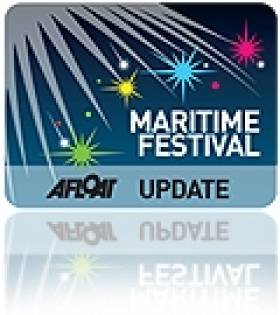Displaying items by tag: Watersport
New Infrastructure Fund Could Rekindle Ambitions For Dun Laoghaire As National Watersport Hub
Ambitions for a National Watersport Centre in Dun Laoghaire could be revived following the launch of a new State fund supporting infrastructure for multi-sports projects.
Applications are now being invited for the the Large Scale Sport Infrastructure Fund, launched by Ministers Shane Ross and Brendan Griffin this week.
The scheme is initially open to applications from national governing bodies (NGBs) and local authorities (LAs) and will consist of two streams.
Stream one, which is aimed at smaller NGBs and LAs, will help fund the development of proposals to tender stage. Stream two will assist applicants to bring projects from tender stage to completion.
The scheme encourages multi-functional sports facilities that will serve more than one sport — which is in line with previous proposals to make Dun Laoghaire a national hub for sailing, kayaking, rowing and more.
Sharing between sports, NGBs and LAs is encouraged and such projects will be viewed more favourably by the fund. The scheme will also require a minimum contribution of 30% from applicants toward the cost of any works/design.
The new fund is separate and distinct from the Department of Transport, Tourism and Sport’s long-running Sports Capital Programme (SCP), which is focused on smaller capital projects where the maximum grant is €150,000.
The full terms and conditions of the Large Scale Sport Infrastructure Fund and application forms can be found HERE.
Water-Based Pursuits Make For Great Adventure Getaways
#Tourism - Activities on the water feature heavily in The Irish Times' new guide to adventure holidays around the country.
Kitesurfing and kayaking on the coast are go-to pursuits at all times of year, but some activities that may be less familiar include coasteering – a combination of rock climbing and scrambling across the more rugged parts of the coastline.
Thrills can also be had by the less athletically inclined by float tubing – essentially swimming with a giant inflatable ring – and 'ride and tide', a mix of horse riding on sand and through surf and kayaking to an offshore island.
But for those of a calmer disposition, there's free diving, which employs yoga and breathing techniques to relax the body while under water, and the sedate charms of canoeing on the Barrow.
The Irish Times has more on the story HERE.
Waterways Ireland 2015 Sponsorship Programme Now Open
#InlandWaters - Waterways Ireland's 2015 Sponsorship Programme opened this Wednesday 29 October for waterway and waterside recreational events taking place along waterways managed by Waterways Ireland.
Taking place annually for the past nine years, the Waterways Ireland Sponsorship Programme has supported angling, canoeing, rowing, sailing and power sports competitions, learning experiences, community, historical and educational events for people with and without disabilities.
Éanna Rowe, head of marketing and communications with Waterways Ireland, said: "Communities, clubs and associations in towns and villages along rural waterways have participated in small and large events.
"Significant numbers of people have been encouraged to engage and experience something new about the waterways."
Rowe added: "The myriad events supported by Waterways Ireland play both an economic and social role in supporting waterway communities and recreational activity along Ireland's inland waterways."
Applications are open to anyone intending to run recreational waterway and waterside events in 2015. For an application pack please check out the Waterways Ireland website HERE.
Alternatively you can email Waterways Ireland at [email protected] or call 071 96 50787. Terms and conditions apply.
The closing date the receipt of completed applications is 5 December 2014 at 3pm.
Waterways Ireland is the recreation and navigation authority for the Barrow Navigation, Erne System, Grand Canal, Lower Bann Navigation, Royal Canal, Shannon-Erne Waterway and the Shannon Navigation.
Public Urged To Be Aware of Water Risks as Temperatures Soar
#Weather - Irish Water Safety has urged anyone heading to the water on lakes, rivers or beaches during this week's heatwave to take extra precautions as Met Éireann issues a 'yellow warning' amid soaring temperatures.
Speaking to TheJournal.ie, IWS chief John Leach underlined the increased risk of drownings during warmer periods, especially among young people in their teens or early twenties to go swimming in unsupervised areas.
Only today RTÉ News is reporting on the death of a 21-year-old Lisa Knight, who drowned while swimming with friends on the River Feale in Co Limerick in the early hours of this morning.
The heatwave, which is expected to peak on Friday with temperatures in many parts breaking the 30s, has drawn people to coastal areas in droves.
Also on TheJournal.ie, the Irish Coast Guard has reported a 40% increase in call-outs relating to watersport and other leisure activities over the last three weeks compared to the same period in 2012.
A significant number of these relate to rogue jetskiers "tormenting" beach-goers by racing through designated swimming areas on their personal water craft, according to IRCG operations manager Declan Geoghehan.
In related news, the Irish Independent says hoax calls to the coastguard have increased 40-fold since the IRCG was added to the main emergency services accessible by dialling 999 or 112 - and now constitute the "vast majority" of calls received.
Big Decline In Shannon Passages Over Last 10 Years
#Shannon - Passages on the River Shannon in 2013 so far have fallen more than 50% compared to numbers for the same period a decade ago, according to the Irish Waterways History blog written by Afloat's inland correspondent, Brian Goggin.
Using statistics supplied by Waterways Ireland, the site plotted a graph that shows an overall decline in lock and bridge passages on the Shannon in the months from January to May each year since 2003, with a slight spike in 2007 the only buck in the downward trend.
Though the figures do not record all uses of the waterway (such as sailing, angling and other watersports) and do not account for variables such as the weather, they are indicative - the site claims - of "the Shannon's most significant tourism activity, the cruiser hire business".
Indeed, the figures apparently show that boat hire passage numbers have fallen from 11,440 in January-May 2003 to just 4,781 in the same months this year.
Even private boat passages have been falling from a peak in 2009 to just below their 2003 numbers, if the site's interpretation of the stats is anything to go by.
However, a source close to Afloat.ie says that the falling numbers may be skewed by a growing emphasis on larger-capacity vessels on Ireland's inland waterways, with eight- and 12-berth boats supplanting older four-berth vessels, and families and groups consolidating their recreational boating.
It will be interesting to see how the rest of the year turns out, and whether the overall numbers from January to December will tell a different story of the state of the Shannon and other waterways.
Galway Expects Crowds For First Sea Festival
#Festivals - "Tens of thousands" of visitors are expected to flock to the City of the Tribes later this month for the first Galway Sea Festival over the June bank holiday weekend, according to the Galway Advertiser.
Dubbed the 'Mini-Volvo' by locals, the four-day event from 31 May till 3 June is hoped to recreate the celebratory atmosphere of last summer's successful Volvo Ocean Race finale, with a wide range of events both on and off the waters of Galway Bay.
Highlights include the festival regatta led by the Galway Bay Sailing Club's parades of sail on the Friday and Saturday evenings, and a traditional boat regatta by Badoiri na Cladaigh.
Watersports enthusiasts can get a taste of canoeing, diving, sea kayaking and windsurfing over the weekend, which also coincides with World Oceans Day - with family-friendly activities at the Galway Atlantaquaria on Sunday 2 June - and the International Canoe Polo Championships at Claddagh Basin.
Preceding the festival on Thursday 30 May will be the Bright Blue Sea Conference, a major international symposium on marine science, renewable energy, the environment and the 'blue economy'.
Last month it was reported that the Galway Sea Festival received the financial backing of Galway City Council, spurred by its aims to promote Galway as a maritime destination or commerce and tourism.
The Galway Advertiser has much more on the festival HERE.
Irish Harbours Get €7.4m Funding for Remedial Works
#IrishHarbours - Funding of €7.4 million for urgent remedial works at six regional harbours has been announced by Minister for Transport, Tourism & Sport Leo Varadkar.
The funding will pay for repairs and safety works on essential harbour infrastructure, and is likely to benefit the local economy, promote leisure activities and support the fishing industry.
“This funding will allow essential works at these regional harbours on piers, walls and harbour structures," said the minister. "This work is necessary as part of their transfer from central Government to local authority control.
“Harbours play an important role in their communities in terms of fishing, cargo and leisure and play an increasingly important role in tourism and watersports."
Minister Varadkar added: "The large-scale safety or construction projects planned for Kinsale, and for Baltimore & Skibbereen Harbour this year will be able to go ahead thanks to this funding. Smaller scale projects at other harbours can also proceed, including essential works at Arklow Harbour.”
The funding has been allocated to the following harbours:
Arklow - €3,588,000
Baltimore & Skibbereen - €1,165,000
Bantry Bay - €100,000
Kinsale - €1,467,000
Tralee & Fenit - €750,000
Wexford - €329,500
The funding has been concentrated on remedial works to ensure that the harbours are in a fit condition during their transfer to local authority control.
Twelve of the 13 regional harbours have transferred to date, with 11 being taken over by local authorities, and one designated a fisheries harbour.



























